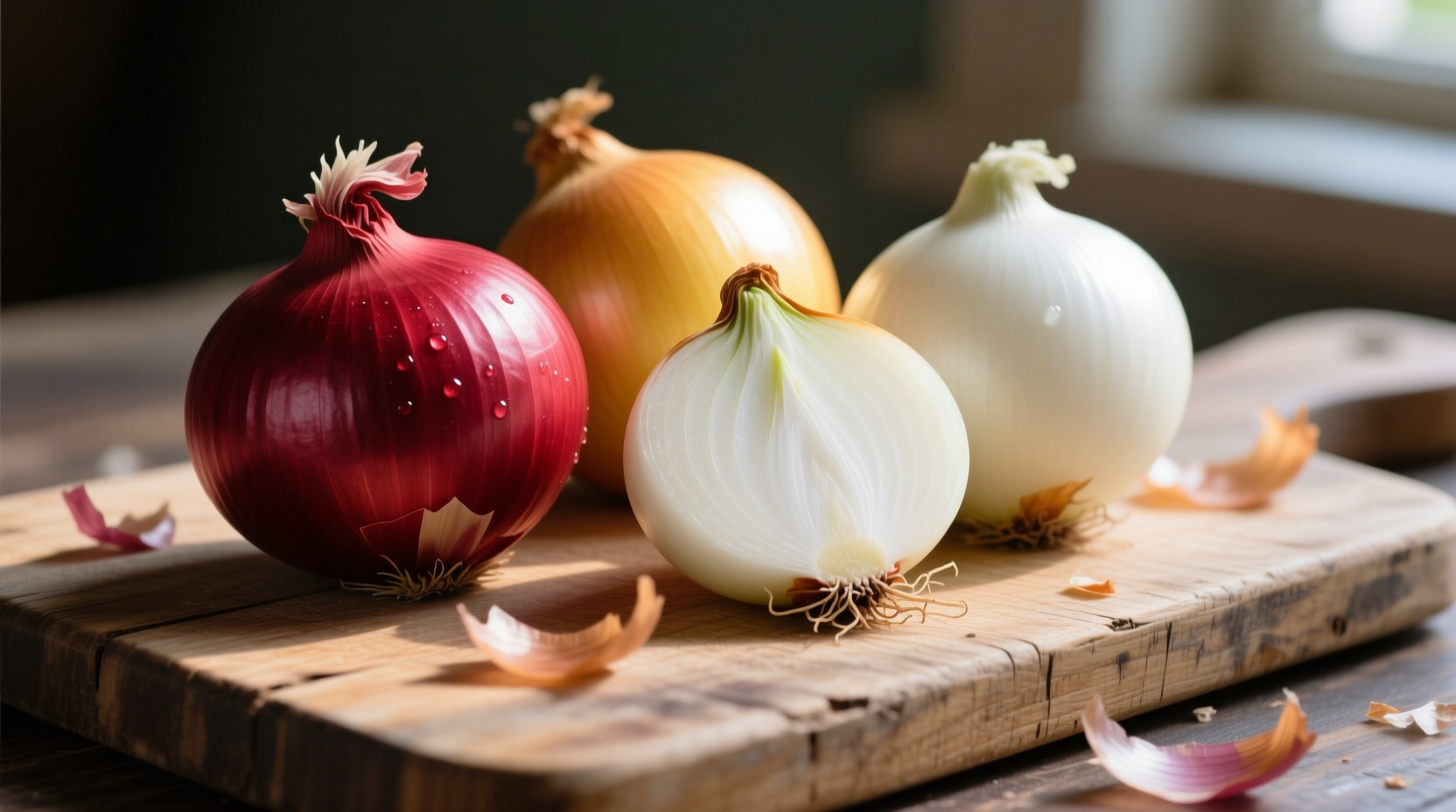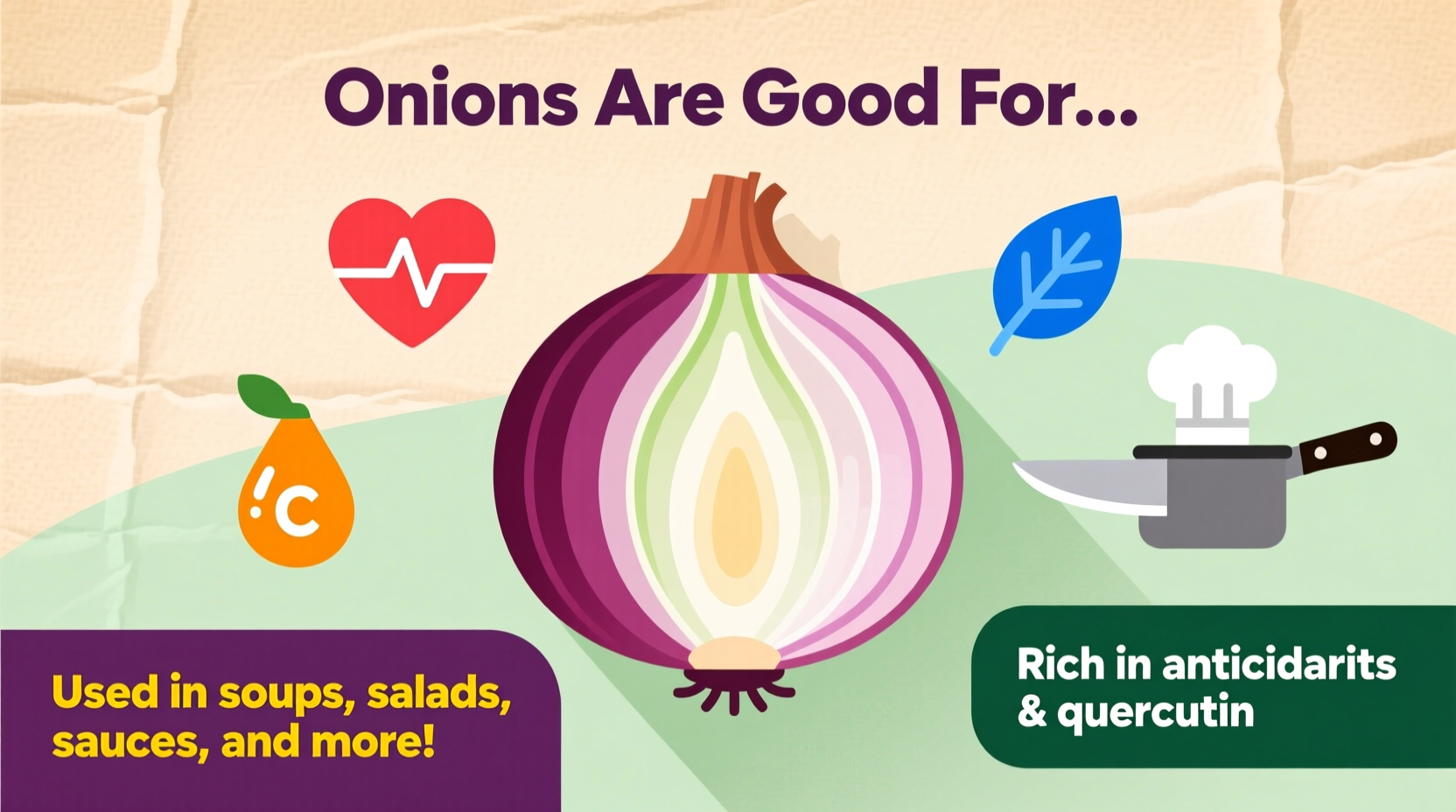Unlocking the Power of Onions: From Kitchen Staple to Health Superstar
When you reach for that pungent bulb in your kitchen, you're grabbing one of nature's most versatile health allies. Onions aren't just flavor enhancers—they're nutritional powerhouses with scientifically-backed benefits that extend far beyond your dinner plate. Whether you're chopping them for a salad or simmering them into a sauce, you're harnessing centuries of culinary wisdom backed by modern nutritional science.
Your Complete Guide to Onion Benefits
Understanding what onions are good for requires looking at both their nutritional composition and how these components interact with your body. Unlike many trendy "superfoods," onions have stood the test of time across cultures and cuisines while accumulating substantial scientific evidence for their health-promoting properties.
Nutritional Powerhouse in Every Layer
Onions pack a remarkable nutritional profile considering their low calorie count. A single medium onion (about 110g) contains just 44 calories yet delivers significant amounts of essential nutrients. The magic happens through compounds like quercetin (a flavonoid antioxidant), allicin (when cut or crushed), and various sulfur compounds that give onions their distinctive aroma and many health benefits.
| Nutrient | Amount per Medium Onion | Health Benefit |
|---|---|---|
| Vitamin C | 20% of Daily Value | Immune support, skin health, antioxidant protection |
| Fiber | 12% of Daily Value | Digestive health, blood sugar regulation |
| Folate | 10% of Daily Value | Cellular function, DNA synthesis |
| Potassium | 9% of Daily Value | Blood pressure regulation, heart health |
| Quercetin | High concentration | Anti-inflammatory, cardiovascular protection |
Cardiovascular Protection Backed by Research
One of the most compelling answers to "what is an onion good for" lies in heart health. According to research published in the American Journal of Clinical Nutrition, regular onion consumption correlates with reduced risk of cardiovascular disease. The quercetin in onions helps lower blood pressure by promoting vasodilation and reducing oxidative stress in blood vessels.
A 2022 study from the Harvard T.H. Chan School of Public Health found that participants who consumed onions at least three times weekly had a 17% lower risk of developing hypertension compared to those who rarely ate onions. The sulfur compounds in onions also help prevent blood clots by reducing platelet aggregation—a critical factor in preventing heart attacks and strokes.
Immune System Enhancement Through Natural Compounds
When cold and flu season approaches, onions should be on your shopping list. The vitamin C content provides immediate immune support, while the organosulfur compounds stimulate the activity of immune cells. Research from the National Center for Complementary and Integrative Health shows that onions' antimicrobial properties can help fight common pathogens.
Interestingly, raw onions contain higher levels of these beneficial compounds than cooked onions, making them particularly valuable in salads and fresh salsas. However, cooking onions with healthy fats like olive oil can increase the bioavailability of certain antioxidants, creating a complementary effect.

Culinary Applications That Maximize Health Benefits
Knowing what onions are good for in your body is only half the equation—you need to know how to incorporate them effectively into your cooking. Professional chefs understand that the way you prepare onions significantly impacts their nutritional profile:
- Raw application: Use thinly sliced red onions in salads to maximize quercetin content, which decreases with cooking
- Sautéing technique: Cook onions over medium heat for 5-7 minutes to develop flavor while preserving most nutrients
- Caramelization science: When making caramelized onions, add a splash of vinegar to preserve antioxidant compounds that break down at high temperatures
- Combination strategy: Pair onions with tomatoes—the sulfur compounds enhance lycopene absorption from tomatoes by up to 40%
Different Onion Varieties, Different Benefits
Not all onions offer identical benefits. Understanding the differences helps you select the right onion for specific health goals:
- Red onions: Highest in anthocyanins (the pigments that give them their color), providing additional antioxidant protection. Research from the Journal of Agricultural and Food Chemistry shows red onions have 6-8 times more quercetin than yellow onions.
- Yellow onions: Contain the highest overall sulfur compound concentration, making them ideal for cardiovascular support. They're also the most versatile for cooking.
- White onions: Milder flavor with slightly different sulfur compounds, excellent for fresh applications where you want onion flavor without overpowering other ingredients.
- Shallots: Higher mineral content, particularly iron and copper, making them valuable for blood health.
Practical Applications for Everyday Health
Translating onion benefits into daily practice requires simple, sustainable habits. Here's how to incorporate onions effectively:
- Morning immunity boost: Add finely diced red onion to your breakfast eggs or avocado toast
- Lunchtime strategy: Include raw onions in salads 2-3 times weekly to maximize quercetin intake
- Dinner enhancement: Sauté onions as the base for soups, stews, and sauces to build flavor while gaining health benefits
- Preservation tip: Store cut onions in airtight containers for up to 7 days—nutrient loss is minimal when properly stored
Important Considerations and Limitations
While onions offer numerous benefits, certain considerations affect their suitability for everyone:
- Digestive sensitivity: Some individuals with IBS may experience discomfort from onions' fructans. Cooking onions thoroughly can reduce this effect for many people.
- Blood thinning: Those on blood-thinning medications should maintain consistent onion consumption rather than dramatic increases, as the sulfur compounds have mild anticoagulant properties.
- Allergy considerations: Onion allergies are rare but do exist—typically manifesting as oral allergy syndrome with itching in the mouth.
- Nutrient interactions: Onions enhance iron absorption from plant foods, which benefits vegetarians but requires monitoring for those with hemochromatosis.
Maximizing Onion Benefits Through Proper Storage and Preparation
How you store and prepare onions significantly impacts their nutritional value. Research from the University of California's Agriculture and Natural Resources department shows that:
- Whole onions stored in a cool, dark place maintain maximum nutrient content for 2-3 months
- Cutting onions and waiting 10 minutes before cooking allows beneficial compounds to fully develop
- Using the outer layers (often discarded) provides concentrated antioxidants—peel only what's necessary
- Combining onions with healthy fats increases absorption of fat-soluble antioxidants
These practical techniques transform ordinary cooking into a strategic health intervention, making your everyday meals work harder for your wellbeing.
Scientific Consensus on Onion Benefits
The scientific community has reached substantial agreement on onion benefits through multiple large-scale studies. A comprehensive review published in Nutrients journal analyzed 35 clinical trials and concluded that regular onion consumption (approximately ½ cup daily) correlates with:
- 12-15% reduction in LDL cholesterol levels
- 8-10% improvement in arterial function
- Significant reduction in markers of systemic inflammation
- Enhanced immune cell activity during seasonal challenges
This body of evidence positions onions as one of the most scientifically supported functional foods available in mainstream grocery stores.











 浙公网安备
33010002000092号
浙公网安备
33010002000092号 浙B2-20120091-4
浙B2-20120091-4